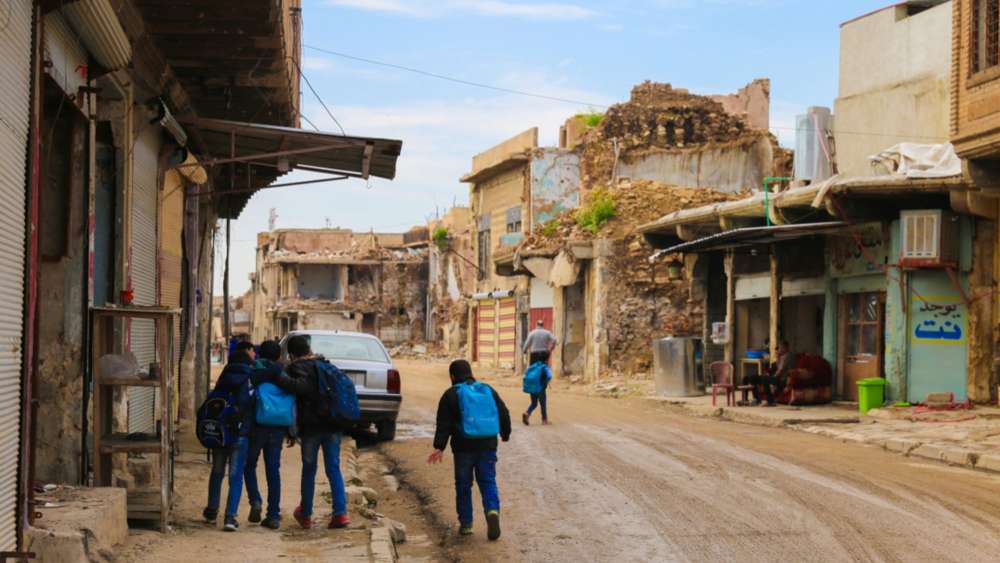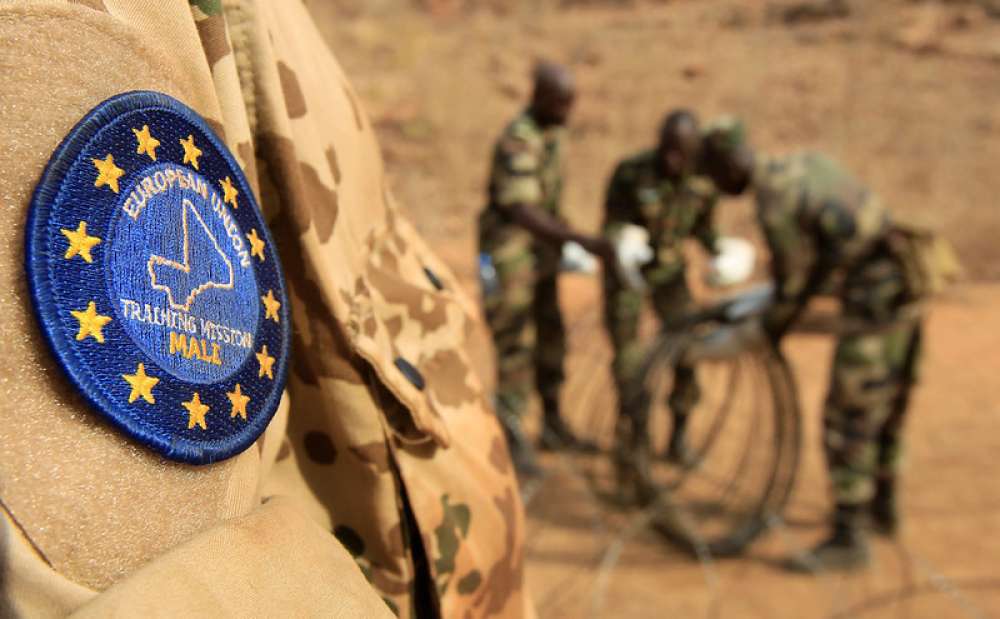How to Design a National Security Strategy with Peace in Mind
Germany's security will be decided in the international arena and secured through transformative approaches to conflict resolution. To draft a successful and worthy strategy, Berlin will need to approach it with a global peace mindset.
Germany’s reference to the current Zeitenwende – or turning point – alludes to the fact that we are experiencing uncertain times of great change. Even beyond the war in Ukraine, Berlin’s political processes have been forced to evolve around epidemics, climate change, armed conflicts, and growing fragmentation of democratic societies in an increasingly digitalized context. In this setting, Germany’s security will be decided in the international arena, as local crises can quickly spill over to become regional or global challenges. These challenges must be addressed at the local, national, regional, and global levels. All the while, crisis prevention remains key to security interests and policies.
Certainly, prevention encompasses multi-layered approaches on both the policy as well as the practical level. Already back in 2017, the German Federal Foreign Office’s Guidelines “Preventing Crises, Dealing with Conflicts, Building Peace” defined a comprehensive political framework for civil crisis prevention and peacebuilding. These guidelines should now serve as the foundation for an explicit National Security Strategy, whose mandate must be further developed against the backdrop of global political changes. In order to address these political shifts and their associated risks, taking a long-term strategic view is critical. Germany’s new security strategy should integrate strong approaches to crisis prevention, climate change adaption and attention to justice and human rights issues. The existing Guidelines already highlight the importance of dialogue and mediation – and from our experience,awknolwedgement these are critical parts of prevention and conflict transformation. A successful National Security Strategy will honor the guidelines as a political framework for civil crisis prevention and peacebuilding, and commit to further developing its potential, operationalizing it and enabling its realization and implementation through substantive financial resources.
Key Points:
- Germany needs to apply a climate-risk lens to its upcoming National Security Strategy.
- If Germany wants to protect its security, it must set up the infrastructures for building long-term peace – which includes promoting peace education.
- Crisis prevention can only succeed if experts from science, business, government, and civil society work together – and include the voices of those most affected by violent conflict.
Based on our experience, there are a several additional steps that the German National Security Strategy should implement if Berlin wants to support conflict transformation processes around the world.
Address the Conflict-Climate Nexus
Somalia is one of the countries dramatically impacted by climate change, with immense pressure on its resources. In the country, water for irrigation is lacking, fertile land for agriculture is disappearing and trees are being cut down as people search for alternative ways to earn a living. As more disputes arise over these resources, inclusive dialogue sessions and climate-focused (insider) mediations are effective tools for responding to climate risks and their impact on existing conflict dynamics. At the same time, communities need to be supported not only to resolve conflicts without escalating to violence, but also to pave the way for climate adaptation through collaboration. This is a challenge and opportunity not only for Somalia, but for its international partners as well.
Therefore, Germany’s National Security Strategy needs to integrate a climate-risk lens throughout its processes. It also needs to consider peace, development and security as a joint package and pave the way for peace infrastructure through conflict-sensitive support post-war – ideally leading to violence prevention. As German Foreign Minister Annalena Baerbock highlighted in her speech in September: “… we must coordinate much more closely with one another in the spheres of foreign, economic, energy, and development policy.”
» Germany’s National Security Strategy needs to integrate a climate-risk lens throughout its processes. «
On an operative level, this will require clear and fast ways of networking between German ministries and German and international civil society institutions across established silos. A successful National Security Strategy must lay out the infrastructure for such collaboration and facilitate its operationalization both at home and abroad.
Promote Peace Processes Within Societies
The climate crisis, COVID-19 pandemic, new wars, and economic inequalities are some of the most pressing global challenges today and mount to a poly-crisis, which puts intense pressures on societies worldwide. At present, an increase in politically and ideologically framed fragmentation can be observed in Germany and globally, posing a permanent challenge for both the security authorities and society more broadly. However, there are new alliances forming across countries and groups to tackle specific policy issues. These groups push for joint crisis response, justice and rights-based approaches to economic and political issues, and commitments to the peaceful and nonviolent transformation of crises in light of the urgency and enormity of the problems ahead. The coalitions pursuing feminist foreign policies are just one example.
A central lesson from our work, whether in schools in Germany, in refugee camps in Jordan or in dealing with the violent past in the South Caucasus, is that education – especially education for peace – is essential for our shared human security and future. Peace education takes many forms: for example, teaching young (and older) people how to critically engage with conspiracy theories and their underlying narratives, encouraging socio-emotional learning, strengthening citizens’ ability to deal with conflict constructively, and building up their tolerance to ambiguity in times of complexity.
» Education – especially education for peace – is essential for our shared human security and future. «
While Germany’s National Security Strategy will likely focus on securing peace in the short term, it also needs to set in place the infrastructures at home and elsewhere for building long-term peace. Peace education – including critical examinations of the causes of previous violence and even supporting a willingness to reconcile – will need to be part of this framework. All of this requires resources, structures and qualified personnel. In the best case, post-conflict care then leads to violence prevention.
Include Those Most Affected in Research and Assessment
In the long term, crisis prevention can only succeed if representatives from science, business, government, and civil society work together – and conduct participatory research and assessment with those actors most affected by violent conflict, who are often marginalized from articulating or evaluating solutions. Cutting-edge participatory research, sufficiently funded to proceed at speed, is needed to explore the intersections between different issues, for instance gender, climate and conflict, which no longer can be considered in separation.
A successful National Security Strategy must provide funding for research that allows us to ground security discussions in the needs of those most affected by insecurity and that enable us to tackle the challenges of the 22nd century.
» A successful National Security Strategy must provide funding for research that allows us to ground security discussions in the needs of those most affected by insecurity. «
To facilitate the capacity-building of policymakers and community leaders in conflict contexts, comprehensive and systematic support for local ownership and knowledge transfer around developing conflict transformative adaptation solutions must be driven forward. Through such an international, multi-stakeholder exchange, there is hope that a rise in violence can be effectively prevented within societies – between the European Union and its neighbors, and at other levels.
A worthy National Security Strategy can be designed with a peace mindset: in multi-actor partnerships, with a pervasive peace education system and with participatory approaches and research into the needs and impact on those most affected by crises.
Beatrix Austin
Head of Department – Conflict Transformation Research, Berghof Foundation
Uli Jäger
Head of Department – Global Learning for Conflict Transformation, Berghof Foundation
Mandana Afshar
Innovation Specialist, Berghof Foundation
Weiterlesen

Prioritizing the Protection of Civilians in National Security
When drafting security policy, those most affected by conflict are often missing from the equation. Applying a protection lens to Germany’s upcoming security strategy would be a way of putting civilians first.

National Security Means Addressing the Climate Crisis
When it comes to national security, the climate crisis is just as – if not more – threatening than traditional concerns like conflict and war. How can Germany embrace climate action?

“The Issue of Good Governance has Become Too Marginalized in German Security Assistance”
Germany has shifted its approach to stabilization in the Sahel, from peacebuilding to a stronger emphasis on militarization. The results have been disappointing, says Olivier Guiryanan. Why Berlin should adjust course – and how.
